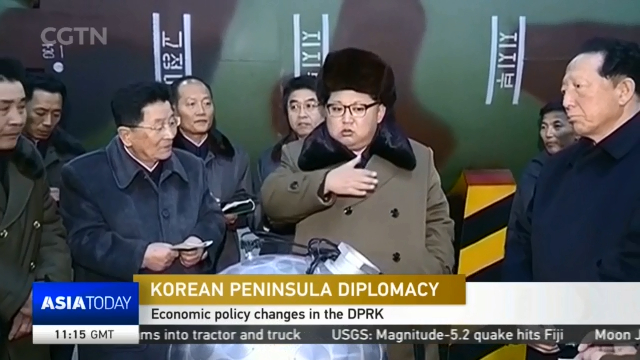
19:31, 27-May-2018
Korean Peninsula Diplomacy: Economic policy changes in the DPRK
02:24

The DPRK has made some changes to improve its people's living conditions, especially after Kim Jong Un came to power. CGTN's Christy Scull takes us through the country's economic policy changes.
Under the leadership of Kim Jong Il, the Democratic People's Republic of Korea implemented the Sungun Policy.
"You can live without candy, but can't survive without bullets." That's how the DPRK's state media used to describe the policy.
After Kim Jong Un became the leader, he inherited his father's policy, and eventually made changes to those very policies.
In March 2013, one year after Kim took office, he put forward a policy which focused on economic construction and nuclear force construction. He elevated the policy of economic development to a national level. In November of the same year, the country set up 13 economic development zones and new Sinuiju Special Economic Zones. These moves helped improve the nation's economy.
According to South Korea's central bank, the DPRK's economy grew by just over 1% in 2012 and 2013, with a gross domestic product of about 30 billion US dollars.
The Kaesong Industrial Region is a special administrative industrial region in the DPRK. South Korea and the DPRK began cooperation in the construction of the Kaesong Industrial Park in 2003, with the aim of attracting investment from South Korean enterprises. The industrial park opened in December 2004.
At times of tension between the two countries, the industrial park has been shut down. It was closed after the DPRK withdrew all of its staff in 2013, but was later reopened five months later. In 2016, the South Korean Ministry of Unification announced that the industrial park would be "temporarily" closed down and that all staff would be recalled. This was done partly in protest over continued provocations from the DPRK, including a satellite launch and a claimed hydrogen bomb test in January.
Since 2006, the DPRK has conducted six nuclear tests which have all led to a series of international sanctions being imposed on the country.
On April 21st of this year, the DPRK announced it will suspend all nuclear tests and concentrate all efforts on developing its economy and improving people's living standards. CGTN.

SITEMAP
Copyright © 2018 CGTN. Beijing ICP prepared NO.16065310-3
Copyright © 2018 CGTN. Beijing ICP prepared NO.16065310-3